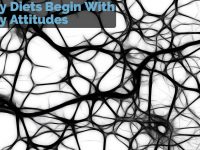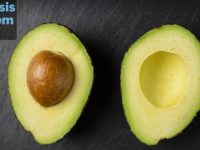Last week I kicked off this series on weight loss with a look at the role exercise plays. This week, we’re switching gears and examining attitudes towards both food itself and the process of dieting in general.
This might seem like an odd topic to cover, but in my opinion it’s probably the most important topic in the series. In my experience working with the public on weight loss, most people are familiar with the basic concepts surrounding dieting—they understand the basics of balancing calories, eating fewer processed foods, etc.—but still struggle the same as anyone when it comes to making changes. The problem clearly isn’t that they don’t know what they’re doing (doubly so since they’re working with me and I’m giving them literal instructions!), but rather that losing weight requires more than physical changes in terms of diet and exercise—it requires mental changes.
I covered this briefly last week when I wrote about the importance of finding some form of physical activity that isn’t a chore. To many people, “exercise” means doing something they don’t enjoy, and as long as that’s how they define physical activity they’re never going to be able to consistently engage in it. Telling these people to go out and get more exercise is going to fail for 95% or more of them, and again, it’s not because they don’t understand what exercise is but because it’s something they don’t enjoy. On the other hand, if you get them to reframe what exercise can mean by encouraging them to find an activity they love, then perhaps they’ll find a lifelong passion that’s pro-health.
Now, we’re going to apply the same treatment to diet and food.
Attitudes About Losing Weight: Dieting vs. Dietary Change
It’s easy to fall into the trap of thinking about your diet simply as a means to lose weight, but the bigger picture is that your diet is really about lifelong health. A diet that helps you lose weight but doesn’t support health long-term doesn’t help you become a healthier human. Often, once the weight is lost, the unhealthy diet returns and you’re no better for it—or sometimes even worse.
Just as with exercise, there’s a tendency of thinking of “dieting” as chore. It doesn’t need to be. When you approach dieting as something onerous but “important”, you cease to link healthy, everyday dietary patterns to healthy outcomes and create an illusion that specific, unpleasant “diets” lead to results. And, just as with exercise, there’s a better way.
Long-term weight loss (or weight maintenance) doesn’t come about through short-term fixes, it’s the culmination of building long-term, healthy dietary habits. Just as a person who finds an athletic activity they love naturally becomes fitter over time in the pursuit of it, a person who finds healthy eating behaviors they love will over time develop a healthier diet and body. In this way, “dieting” isn’t really about razing your old diet to make room for a new one, but cultivating behaviors that improve it, and pruning ones that do not; making dietary changes means admitting there are flaws in the way we’re currently eating without rejecting our diet wholesale.
Identify the things you already do well; nobody has a diet so void of healthy behaviors that there is nothing to be proud of, nothing to salvage. Those healthy behaviors are a great place to begin because…
- You’re already doing them, possibly effortlessly.
- They tell you something about what you enjoy and what’s possible to sustain long-term.
- They remind you that there are positive things about your diet, even if you feel unhealthy.
In other words, find the healthy behaviors you already have and don’t struggle with and use them as your base. Identify what it is about those behaviors that appeals to you or makes them easy to follow, and then expand upon them. Take what’s working and propagate it!
Dieting Requires Change… But Should Still Be Based in Reality
When I wrote the Primers on weight loss two years ago, one point I made was that all dieting requires change and is, by nature, unsustainable. Specifically, what I meant by that is that dieting for weight loss requires a caloric deficit, and caloric deficits cannot be held indefinitely. At some point, you’ll either reach the weight you want and increase calories consciously or unconsciously begin to eat more (or expend less energy) and bring your caloric intake and expenditure in line that way.
What I didn’t mean is that you should choose a diet that is categorically unsustainable long-term because it is nutritionally incomplete, exhausting to follow, not appealing to you, or otherwise not based in real-world eating patterns. On the contrary, whatever diet you pursue weight loss with should at least resemble the diet you plan on eating long-term, even if it’s shy a few calories.
Earlier this week, I read an excellent, short article on this topic by Dr. Yoni Freedhoff (an obesity doctor out of Canada), who summarized this idea well. While the article was mostly about how there’s no “one size fits all” approach to dieting, he wrote this towards the end:
The one thing successful dieters have in common is that they reduce their calories on their new diets and like their lives and diets enough while on it to sustain its adoption for good. So, while it’s true that you might be able to lose more weight, or to lose weight faster, with one diet versus another, unless you keep living with it forever, that weight’s coming back when you head back to the life and diet that you actually liked before you lost.
The diet you choose to lose weight with will be a template for your future diets (as in the foods you eat); if that template doesn’t work long-term for any reason, the most common result is for you to return to your previous template—the one you had before you began to lose weight. Losing weight isn’t necessarily “enjoyable” in a strict sense of the term, but there are shades to distinguish here, and you’ll do better in all cases if you at least find value in the way you’re eating.
Diets Are About Habits, Not Calories
It’s not just about enjoying your diet, though. There’s another big reason for choosing a diet that is similar to one you hope to hold long-term: habits. Building habits (and breaking others) is one of the most challenging aspects of weight loss because most people who are in the position to lose weight are there because of habits. I don’t say this to put the full burden of responsibility on any person’s shoulders—there is plenty to be said about cultural factors, availability of fresh food, marketing influences, etc.—but rather that regardless of their ultimate roots, it’s the habits we hold that build the people we are.
Knowing, then, that most weight loss diets require habit change—and that failure often comes from reversion to old habits—it makes sense to minimize how many times you need to change your habits. When you go on a short-term weight loss diet, you must change your habits initially to fall in line with the guidelines for that diet, and then you must change them a second time after you cease that diet (unless you intend to go back to your old habits). In particular, the second change will be challenging because you will be untethered from the rules of your weight loss diet, and without firmly established healthy habits the mind will tend towards the same old ruts it once ran along.
As I mentioned earlier, the goal of any weight loss diet isn’t just to lose weight, but to become a healthier person. Short-term diets don’t often help with the latter goal because the habits they’re teaching are only ever meant for a span of months. Approaching weight loss from the perspective of habit change, on the other hand, will improve your health regardless of whether you lose weight—and that makes it much more likely, long-term, that you will succeed.
Think of Food in Terms of Goals, Not Morality
This final point is a bit strange, but it’s important. We have a tendency to associate foods with morality, and that’s not healthy. In it’s most basic form, this means we often call healthy foods “good” and less healthy foods “bad”, but it also permeates fad dieting, where nutrients or ingredients like carbohydrates, fat, gluten, coconut oil, etc. are described in the same moralistic terms.
There are a few problems with thinking of foods this way. The first is that “good” and “bad” are dichotomous, but food does not fall so neatly into categories. There is no single food on this planet that we could exclusively eat and remain healthy. Conversely, there is no food that cannot be enjoyed in moderation within an otherwise healthy diet (excepting allergies and other food/health problems). All foods can be useful in certain circumstances for our goals—which would make them “good” choices—but those same foods in other circumstances could be worthless or detrimental towards our goals (“bad”). This includes foods that are almost unanimously thought of as good, like broccoli; broccoli is a terrible choice for mid-workout refueling! You need to look at the context.
Thinking of foods as “good” or “bad” also leads us towards other symptoms of moral thinking, such as guilt or shame. Everybody makes mistakes—but most people don’t feel guilty or ashamed when they make a mistake on their project and take a fall. Instead, they learn from it and resolve to avoid making that mistake again in the future. By contrast, when a person messes up on their diet, guilt is all too common. Rather than take a step back to examine what went wrong, they judge themselves. That’s not a healthy way to approach dieting!
When you want to lose weight, your goal’s not to never have “bad” foods again, but to follow a diet that encourages healthier food decisions and—ultimately—leads to weight loss. Some foods may be better or worse for your goals, but that doesn’t make them “good” or “bad”, and your food decisions today have little bearing on your future success provided you keep moving in the right direction. Your goals don’t change just because you didn’t have a perfect day, and every day gives you the chance to reflect on what you would do differently tomorrow. Guilt makes it harder to accurately assess and fix the parts of your diet you’d like to improve.
A second and more insidious effect of dividing foods into “good” and “bad” is encouraging disordered eating. Our diets and the foods in them need to be understood in context. When foods are not understood in context—when they’re rigidly divided into “good” foods and “bad” foods—then it opens the door for our diets to become dysfunctional and disordered. Disordered eating can reinforce itself and eventually lead to full eating disorders, but even when this does not happen, it’s linked with increased anxiety and risk for depression. Anxiety around food makes eating hard, and while it may allow you to achieve short-term success because it drives food avoidance, it also makes it more likely you’ll fail when a situation requires flexibility, and is always uncomfortable.
Flexibility is key in a healthy relationship with food. There are no rules so firm or important in dieting that you cannot ignore them occasionally and still succeed. There are no foods so healthy or unhealthy that they can make or break your diet. Dietary flexibility allows you to make the best choice within a circumstance and feel good about it; rigidity allows for you to only choose how you’ll fail.
Long-Term Weight Loss Requires a Healthy Attitude
The key message of this article is that weight loss success doesn’t stem from “going on a diet”, but rather from building a healthy, sustainable diet (with some caloric restriction added in). For some people, the first step towards this type of diet may not involve weight loss but rather weight maintenance. Rome wasn’t built in a day, as they say—but more to the point, if it was built in a day, it probably wouldn’t still be around.
When you’re working on your diet, keep a few things in mind:
- Your diet already has healthy parts. Identify these parts and spread them.
- You need to enjoy the way you eat. If you don’t enjoy the changes you make to your diet, you probably won’t keep them.
- You’re building (and breaking) habits, and that doesn’t happen immediately. Be patient with yourself, and remember that your healthy habits will encourage better health even before they encourage weight loss.
- Food is amoral. There are certainly foods that you may need to restrict to achieve your goals, but that does not make them “bad”, and it doesn’t mean you can never have them and still succeed. Long-term success depends on your building a healthy attitude towards dieting, which means allowing yourself to have better and worse days and learning from them.
Healthy attitudes beget healthy habits beget health; hence, healthy attitudes are the beginning of long-term weight loss. Prioritize making healthy changes to your diet first and foremost, and as those changes build and stick, weight loss will become much easier.















Liked this! Thanks for the reminder to identify what is pleasant about the diet(ary changes) and how some of the new habits are actually improvements. In my case making lunch for the week is not only much healthier but tastes much better, though it is a time investment! Bringing the focus away from calorie restriction is helpful.